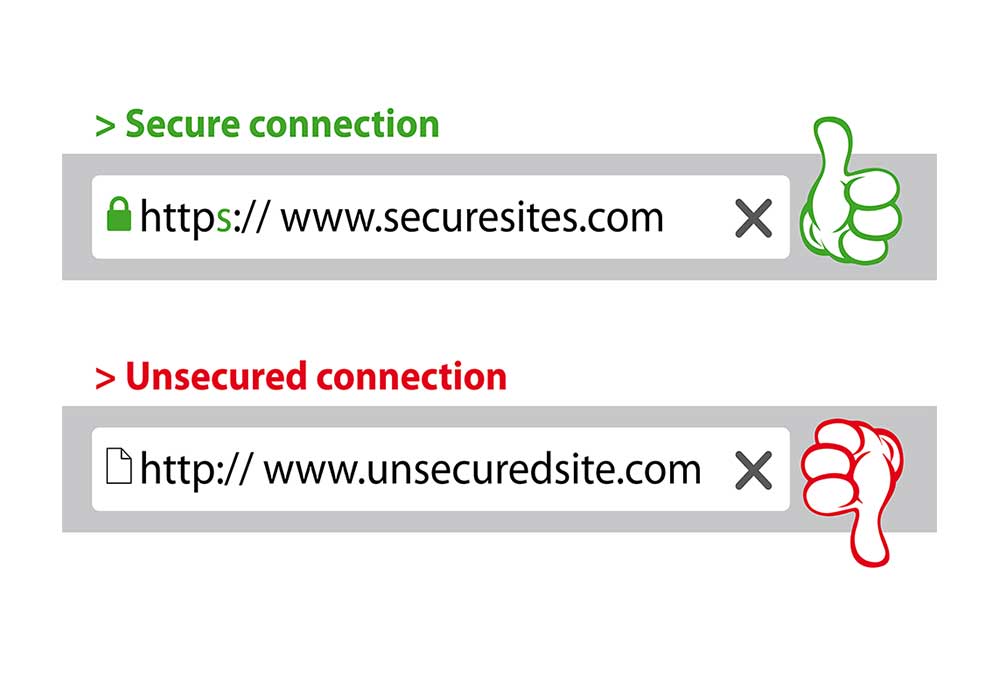HTTPS is the future of the web, here’s what you should know

HTTPS stands for Hyper Text Transfer Protocol Secure. You will find this displayed at the start of a secure website address. For example: Https://www.swiftdigitalwebsites.co.uk.
Having HTTPS is an extension of a HTTP connection so that when data is transferred between servers is kept secure.
Specifically, a HTTPS secure connection is a critical security and data privacy and integrity for both web user’s personal information and for website owners. It helps prevent intrusive companies, malicious attacks and cyber-theft.
HTTPS has also been a signal in Google’s ranking algorithm, since 2014. It’s common fact that HTTPS websites load much faster than HTTP sites, and they tend to rank better and improve conversion rates. More so, having HTTPS builds and enhances customer trust.
According to Blue Corona, “84% of users would abandon a purchase if data was sent over an insecure connection, indicating that website insecurity could potentially impact sales.”
The migration from HTTP to HTTPS should be a priority for every website owner. If you are yet to make the switch we suggest you make the well-worth move sooner than later. Find out from your hosting company if they will install an SSL certificate and do a full migration, if not you can switch to Swift Digital and we’ll do it for you. Call us on (+44) 020 8447 4540.
Here’s a step-by-step guide to how we can help:
1. SSL Certificate and Installation
An SSL certificate contains small data files that digitally bind a cryptographic key to your company details including company name, location, domain name, and server or hostname. We can generate an SSL certificate (various ones to choose from at different prices) from a trusted certificate authority and install this onto your web server. Doing so activates a padlock display and HTTPS secure protocol. Typically, the SSL certificate is used to secure sensitive information such as credit card transactions, data transfer and personal login details.
An SSL certificate contains small data files that digitally bind a cryptographic key to your company details including company name, location, domain name, and server or hostname. We can generate an SSL certificate (various ones to choose from at different prices) from a trusted certificate authority and install this onto your web server. Doing so activates a padlock display and HTTPS secure protocol. Typically, the SSL certificate is used to secure sensitive information such as credit card transactions, data transfer and personal login details.
2. Backup
We can perform up-to-date backup for extra precaution.
We can perform up-to-date backup for extra precaution.
3. Internal Links and Redirects on external links
If you’re big on SEO both internal links and redirects on external links will be of high importance to you, and if it’s not, you will fail at the chance to acquire all the ranking juice from one URL to another. We can help make this a priority when migrating from HTTP to HTTPS secure. Whereby we will redirect old link structures to new links structures prior to the migration with a second redirect.
If you’re big on SEO both internal links and redirects on external links will be of high importance to you, and if it’s not, you will fail at the chance to acquire all the ranking juice from one URL to another. We can help make this a priority when migrating from HTTP to HTTPS secure. Whereby we will redirect old link structures to new links structures prior to the migration with a second redirect.
4. Code Libraries, Scripts and Requests for Googlebot
Considering we are not only website hosting provider but also website developers, you’ll have the advantage of having updated web technologies, such as Javascript and Ajax. We can also update XML sitemaps, Canonical tags, HREF lang, Sitemap references for your Google search console (if applicable).
Considering we are not only website hosting provider but also website developers, you’ll have the advantage of having updated web technologies, such as Javascript and Ajax. We can also update XML sitemaps, Canonical tags, HREF lang, Sitemap references for your Google search console (if applicable).
5. Other
For best performance we ensure to run scans, fix errors, install SSL on CDN (If applicable).
For best performance we ensure to run scans, fix errors, install SSL on CDN (If applicable).
SHARE THIS BLOG ARTICLE
Blog article information
Blog article date:
6 th
Aug 2018
Posted by SDS
Tags Https, Https, Hyper Text Transfer Protocol, Future of Web, Technology
Back to Blogs